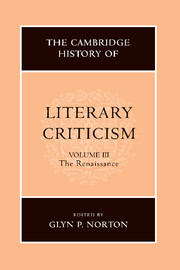Book contents
- Frontmatter
- Introduction
- READING AND INTERPRETATION: AN EMERGING DISCOURSE OF POETICS
- POETICS
- I Humanist classifications
- 7 Humanist classifications of poetry among the arts and sciences
- 8 Theories of poetry: Latin writers
- II The rediscovery and transmission of materials
- III Rhetorical poetics
- IV Literary forms
- THEORIES OF PROSE FICTION
- CONTEXTS OF CRITICISM: METROPOLITAN CULTURE AND SOCIO-LITERARY ENVIRONMENTS
- VOICES OF DISSENT
- STRUCTURES OF THOUGHT
- NEOCLASSICAL ISSUES: BEAUTY, JUDGEMENT, PERSUASION, POLEMICS
- A SURVEY OF NATIONAL DEVELOPMENTS
- Bibliography
- Index
- References
7 - Humanist classifications of poetry among the arts and sciences
from I - Humanist classifications
Published online by Cambridge University Press: 28 March 2008
- Frontmatter
- Introduction
- READING AND INTERPRETATION: AN EMERGING DISCOURSE OF POETICS
- POETICS
- I Humanist classifications
- 7 Humanist classifications of poetry among the arts and sciences
- 8 Theories of poetry: Latin writers
- II The rediscovery and transmission of materials
- III Rhetorical poetics
- IV Literary forms
- THEORIES OF PROSE FICTION
- CONTEXTS OF CRITICISM: METROPOLITAN CULTURE AND SOCIO-LITERARY ENVIRONMENTS
- VOICES OF DISSENT
- STRUCTURES OF THOUGHT
- NEOCLASSICAL ISSUES: BEAUTY, JUDGEMENT, PERSUASION, POLEMICS
- A SURVEY OF NATIONAL DEVELOPMENTS
- Bibliography
- Index
- References
Summary
Humanist theory classified poetry among the arts and sciences in various and sometimes conflicting ways. A given classification affirms not only the priority of some genres, styles, modes, and topics over others, but also the values of a social class or order that poetry might address. Whether for a limited constitutional or patrician republic (Florence, Venice), for a partisan and privileged nobility (the courts of Naples, Urbino, and Ferrara in Italy, or of the Sidney and Leicester circles in England), for an emergently national monarchy (the kings of France or Spain), or for an urban bourgeoisie (Lyons, Barcelona, London), humanist theory formed a canon that defines what literature is or could be among the other arts. It classified poetry chiefly in relation to rhetoric, political philosophy, and the discourse of history.
Medieval grammarians ranked poetry among the natural and moral sciences, as did the Chartrian academician John of Salisbury in his Metalogicon (c. 1160) which associates poetry with diacrisis, ‘vivid representation, graphic imagery’, so that poetry ‘would seem to image all the arts’. Republican humanists of fifteenth-century Florence, however, associated poetry with rhetoric, serving as a practical means to stimulate the intelligence, inspire learning, and persuade to civic virtue. Cristoforo Landino's dialogue on the good life, Disputationes Camaldulenses (c. 1472), for example, interprets the Aeneid as the hero's journey to a Neoplatonic summum bonum. Even though Landino allegorizes the poem in broad abstractions, he grounds its figures of virtue and vice in a historical specificity unknown to medieval commentators.
- Type
- Chapter
- Information
- The Cambridge History of Literary Criticism , pp. 89 - 97Publisher: Cambridge University PressPrint publication year: 1999



